Unit 1 Where did you go on vacation? Section A 知识点课件 (共35张PPT)人教版八年级英语上册
文档属性
| 名称 | Unit 1 Where did you go on vacation? Section A 知识点课件 (共35张PPT)人教版八年级英语上册 |
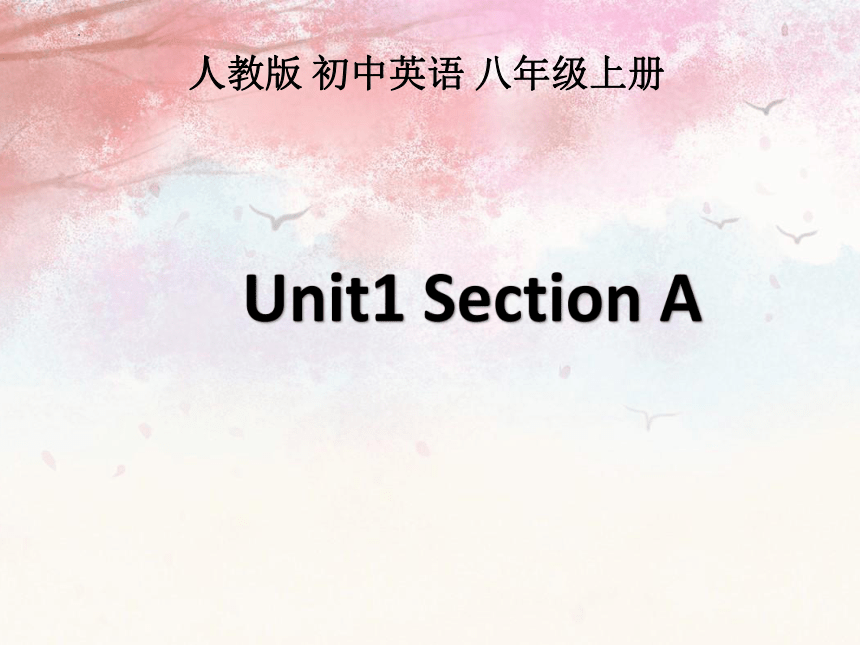
|
|
| 格式 | pptx | ||
| 文件大小 | 1.4MB | ||
| 资源类型 | 教案 | ||
| 版本资源 | 人教新目标(Go for it)版 | ||
| 科目 | 英语 | ||
| 更新时间 | 2024-10-11 16:29:25 | ||
图片预览

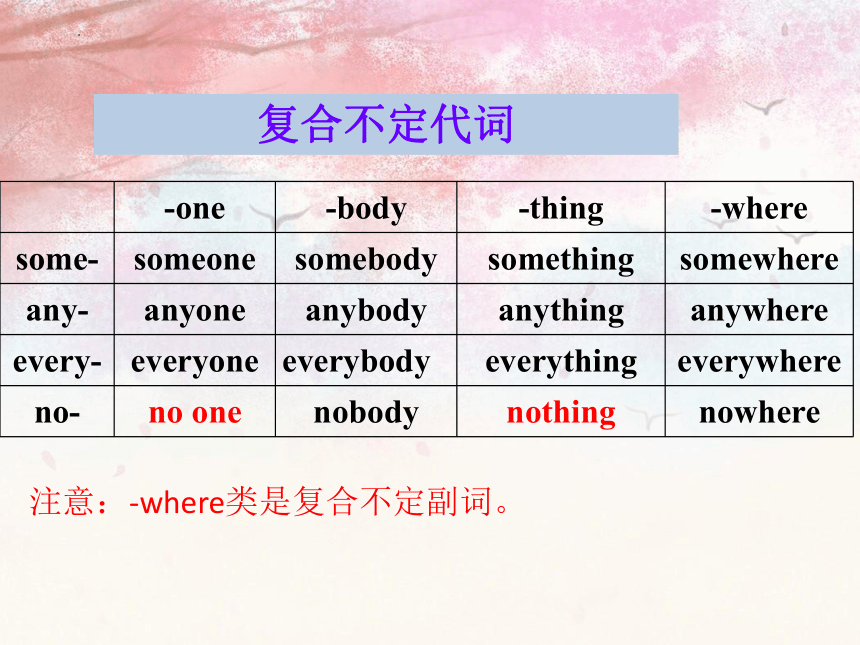

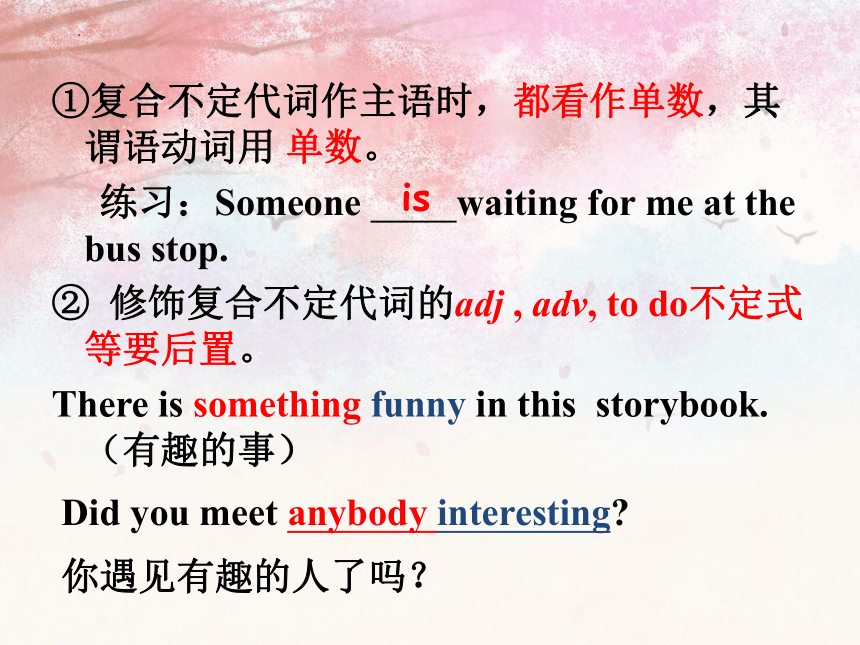
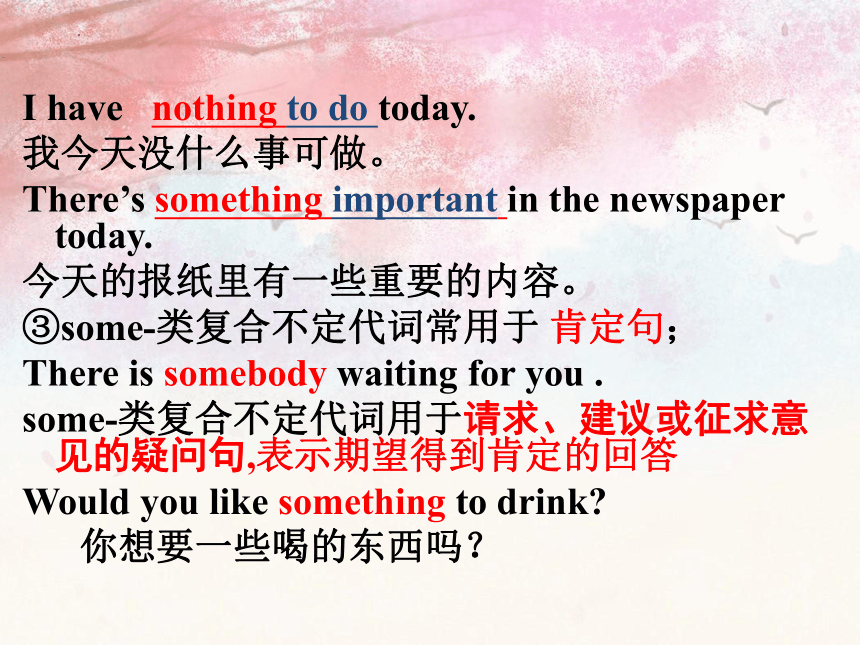
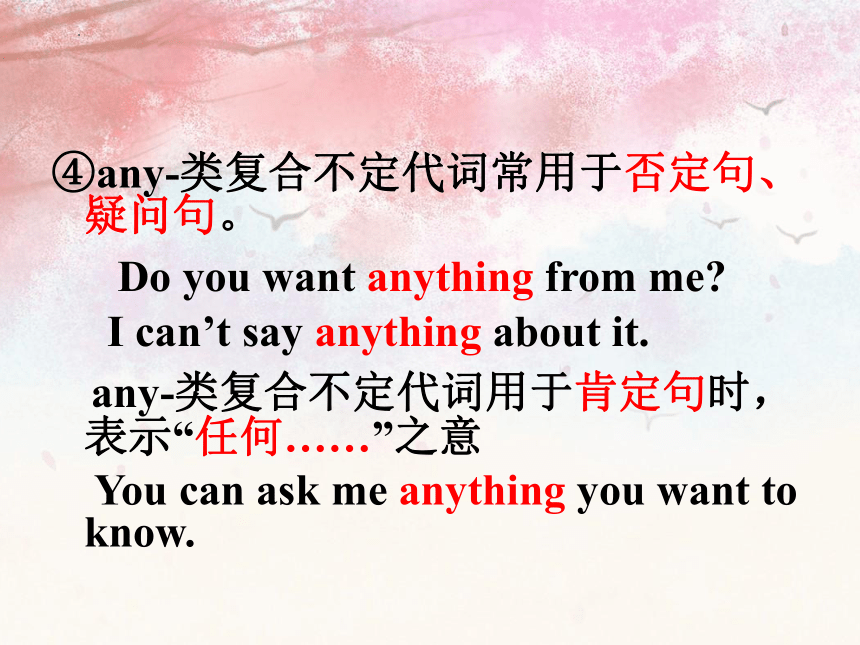
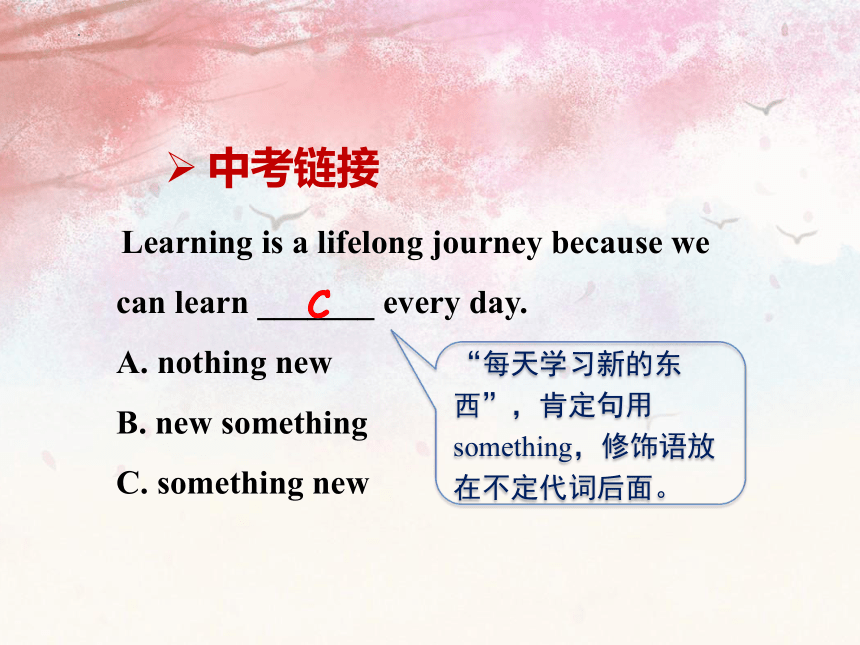
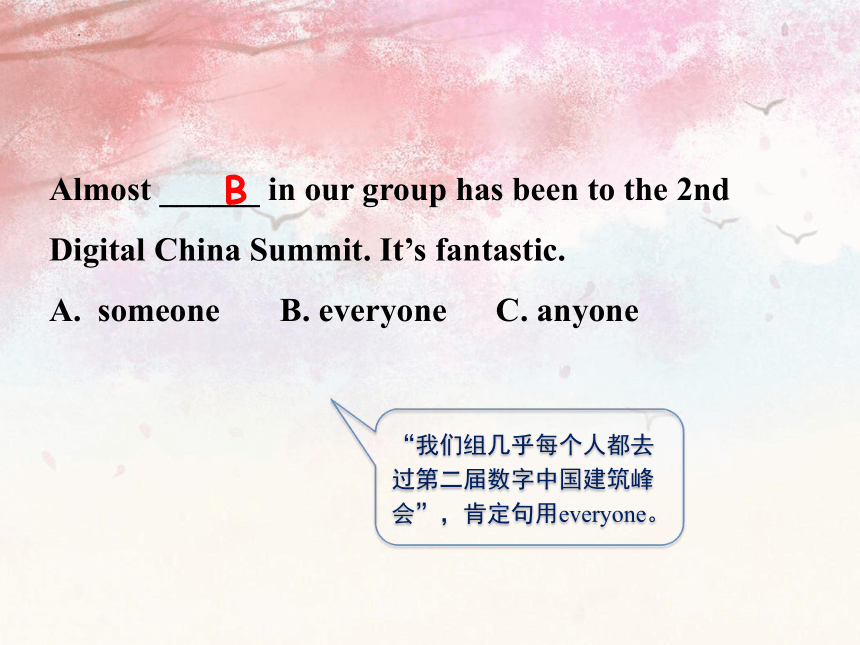
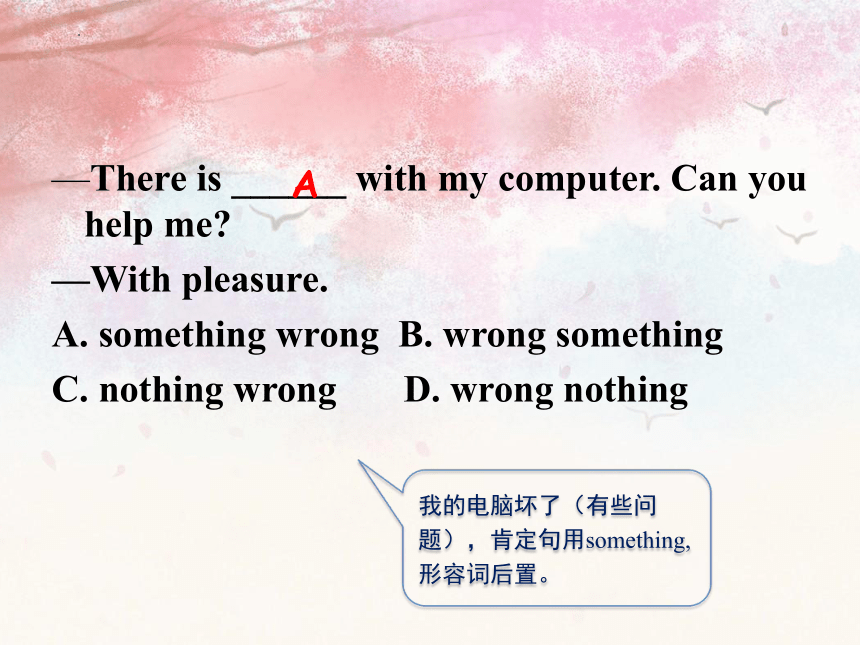
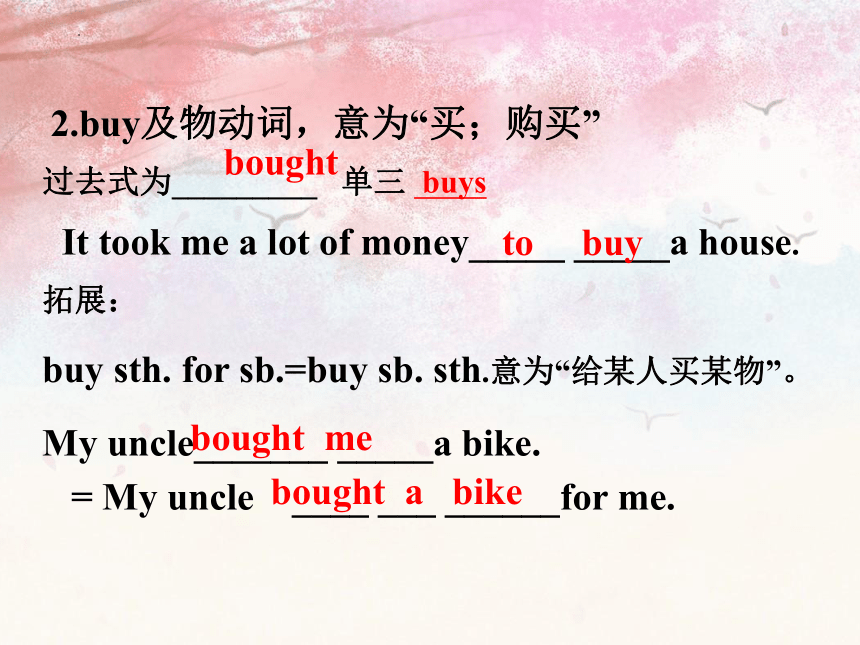
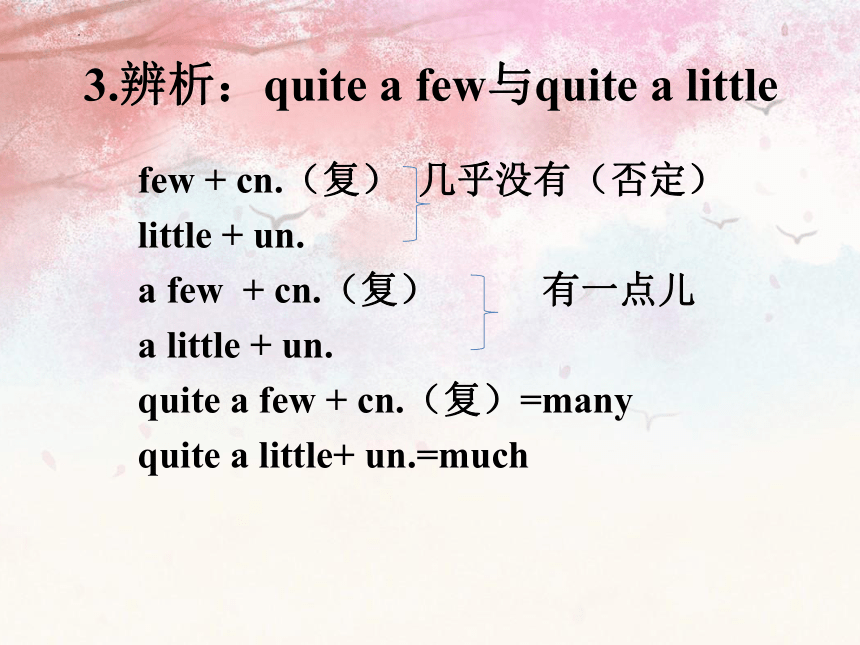
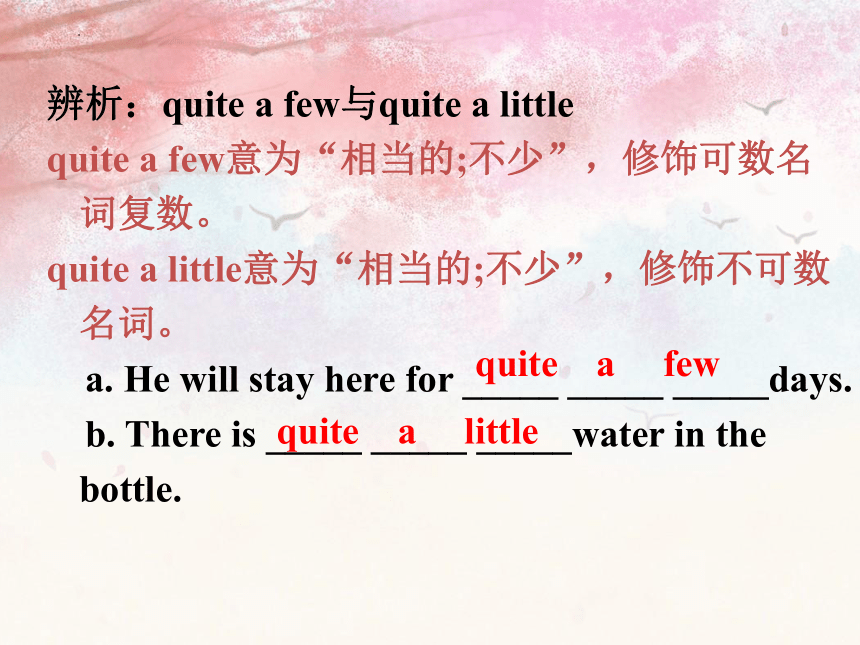
文档简介
(共35张PPT)
人教版 初中英语 八年级上册
Unit1 Section A
复合不定代词
-one -body -thing -where
some- someone somebody something somewhere
any- anyone anybody anything anywhere
every- everyone everybody everything everywhere
no- no one nobody nothing nowhere
注意:-where类是复合不定副词。
复合不定代词指代人或物
-thing类指代事物; -one,-body类用于指人。
Eg: Someone is reading in the classroom.
有人正在教室里读书。
Did you see anything interesting there
你在那什么有趣的事情了吗?
I didn't go to the movies with anyone.
我没有和任何人去看电影。
①复合不定代词作主语时,都看作单数,其 谓语动词用 单数。
练习:Someone waiting for me at the bus stop.
② 修饰复合不定代词的adj , adv, to do不定式等要后置。
There is something funny in this storybook.(有趣的事)
Did you meet anybody interesting
你遇见有趣的人了吗?
is
I have nothing to do today.
我今天没什么事可做。
There’s something important in the newspaper today.
今天的报纸里有一些重要的内容。
③some-类复合不定代词常用于 肯定句;
There is somebody waiting for you .
some-类复合不定代词用于请求、建议或征求意见的疑问句,表示期望得到肯定的回答
Would you like something to drink
你想要一些喝的东西吗?
④any-类复合不定代词常用于否定句、疑问句。
Do you want anything from me
I can’t say anything about it.
any-类复合不定代词用于肯定句时,表示“任何……”之意
You can ask me anything you want to know.
中考链接
Learning is a lifelong journey because we can learn _______ every day.
A. nothing new
B. new something
C. something new
“每天学习新的东西”,肯定句用something,修饰语放在不定代词后面。
C
Almost ______ in our group has been to the 2nd Digital China Summit. It’s fantastic.
someone B. everyone C. anyone
“我们组几乎每个人都去过第二届数字中国建筑峰会”,肯定句用everyone。
B
—There is ______ with my computer. Can you help me
—With pleasure.
A. something wrong B. wrong something
C. nothing wrong D. wrong nothing
我的电脑坏了(有些问题),肯定句用something,形容词后置。
A
2.buy及物动词,意为“买;购买”
过去式为_________ 单三 buys
It took me a lot of money_____ _____a house.
拓展:
buy sth. for sb.=buy sb. sth.意为“给某人买某物”。
My uncle_______ _____a bike.
= My uncle ____ ___ ______for me.
bought
to buy
bought me
bought a bike
3.辨析:quite a few与quite a little
few + cn.(复) 几乎没有(否定)
little + un.
a few + cn.(复) 有一点儿
a little + un.
quite a few + cn.(复)=many
quite a little+ un.=much
辨析:quite a few与quite a little
quite a few意为“相当的;不少”,修饰可数名词复数。
quite a little意为“相当的;不少”,修饰不可数名词。
a. He will stay here for _____ _____ _____days.
b. There is _____ _____ _____water in the bottle.
quite a few
quite a little
.
4.most : adj&adv&pron
①pron. 常与of 连用 most of…“……中的大多数”
most of + cn(单)/un. 谓语动词用单数
most of + cn.(复) 谓语动词用复数
eg:Most of the buildings new.
Most of the building yellow.
② adj.最多;大多数 + cn.(复)/un.
eg: Most people here are from China.
Most boys in our class like playing basketball.
are
is
③adv.大多数 修饰动词
eg:Jiaozi is what I miss(v.) most , when I am abroad.
④many/much more most
little less least
few fewer fewest
at most 最多 at least 最少
I got the most votes . (最高级前加the)
比较级
最高级
比较级
最高级
反义词
比较级
最高级
a. Most of us _____(be) going to the park.
我们大多数人要去公园。
b. Most of the food _____ (go) bad.
大部分的食物都变质了。
are
goes
It seems to be the best method.
这似乎是最好的方法。
seem+(to be) 名词(作表语)
These girls seem to be very excited.
这些女孩子们似乎很兴奋。
seem+(to be) 形容词(作表语)
seem+介词 like +名词 “看上去好像”
seem to do sth. “好像/似乎做某事”
It seems that + 句子“好像/似乎……”
“似乎;好像”
seem 用法
5.seem :似乎,好像
①seem ( to be ) + adj./n 似乎;好像
He seems (to be) a clever boy .(名词)
You seemed (to be) tired.(形容词)
②seem to do sth. 好像做某事
It’s cloudy, and it seems to rain.(rain)
③seem like (介词)+n./n短语
It seems like a good idea.
④It seems/seemed that + 从句 (可与seem to do 互换)
eg:It seems that he is a clever boy.
It seemed that you were tired.
6.感官动词:look看,taste尝,sound听,feel感觉,smell闻
用法:
①感官动词+adj. .....怎么样
“好的”用good,不用well smell good
②与介词like 连用
③感官动词没有进行时没有被动语态
taste
①n.品味;味道 the taste of ...的味道
Lucy has a good taste in clothes.
②tasty=delicious 美味的
练习题:
---What is mum cooking in the kitchen
---Fish , I guess. How nice it .
A: looks B : smells C : tastes D : sounds
B
7.Of course.=Sure.=Certainly当然
Of course not。当然不了。
---Excuse me , may I borrow your pen
--- .Here you are.
Of course. B . Oh , no.
C: Bye-bye. D . Me ,too.
---Did you go to the museum
--- .I saw many old things in the museum.
A .Not really . B . Of course .
C . Sounds good . D . Sorry.
A
B
8.diary:cn.日记 keep a diary / keep diaries
I like keeping to memory life.
9.enjoy (动词)+doing sth 喜欢做某事
enjoyment n.乐趣
enjoyable adj. 有乐趣的;令人愉快的
enjoyably adv. 有乐趣地
Skiing is enjoyable exercise.
diaries
an
10. wonderful adj .精彩的
How wonerful the Great Wall is!
形容词后缀
-able
comfortable舒适的 suitable合适的
valuable有价值的 believable可信的
-ful
beautiful wonderful useful careful thankful
-al
International国际的 national 国家的
形容人 形容物
bored boring
interested interesting
relaxed relaxing
excited exciting
surprised surprising
be bored with 对…感到厌烦
be interested in 对…感兴趣
be excited at 对…感到兴奋
be excellent in 在…是优秀的=do well in
11.反身代词:表示“某人自己的词”
单数 复数
第一人称 myself ourselves
第二人称 yourself yourselves
第三人称 himself
themselves
herself
itself
1) Did you buy anything for yourself
你为你自己买什么东西了吗 (做介词宾语)
2) The old man taught himself English.
那位老人自学英语。(做动词宾语)
3) The thing itself is not important.
事情本身并不重要。(做同位语)
4) I myself visited my aunt last weekend.
上周我自己去拜访了姑姑。(做同位语)
(注意:反身代词不能单独做主语)
反身代词做宾语,常有动词 buy ,help ,enjoy ,teach , hurt 等
teach oneself 自学=learn … by oneself
enjoy oneself 过得愉快
help oneself 随便吃/ 喝
for oneself 亲自
by oneself 独自;单独
1.---Who taught you to play the piano
--- .I learned it by .
A: Somebody ; myself B: Nobody ; myself
C:Nobody;me D:Somebody;me
2.Look! The boys are making the model boat by .
A:himself B: themselves
C:ourselves D:yourselves
3: You are the future of this country . Don’t keep asking what this country do for you .Ask
what you can do for your country.
A: us B : ourselves C : you D:yourselves
B
B
D
12:baby pigs :小猪 (baby在这里是adj ,小的)
13:sb have/has nothing to do but…= there’s nothing to do but … 除了…没事可做
We have nothing to do in the evening but read.
= There is nothing to do in the evening but read.
注意:若but 前有实义动词do,后面+to do;
否则用do形式
We have nothing to do but read.
= I have nothing to say but to keep silent.
My host family tried to cook ______ for me when I studied in New Zealand.
A. different something B. different anything
C. something different D. anything different
2. The man has ______ friends in this city, so he often stays at home.
A. a few B. few C. little D. a little
C
B
I. 单项选择。
Exercises
3. The most beautiful thing about learning is that ______ can take it away from you.
anybody B. somebody
C. everybody D. nobody
D
4.---You added sugar in my tea It terrible!
--- Sorry , madam . I’ll pour you another cup right away.
A: feels B:looks C:sounds D:tastes
D
5.—Is there_______ in today’s newspaper
—No. I think everything in it is boring.
A. interesting anything
B. somebody interesting
C. interesting something
D. anything interesting
D
6.—Did you go last summer holiday
—Yes. I went to Shanghai Disney.
A. somewhere special B. anywhere special
C. special somewhere D. special anywhere
7.It was sunny just now .But now it’s cloudy. It seems soon.
A:rain B : to rain C: raining D : rains
B
B
8. These children are singing and playing after school in the park . They seem very
.
A: happy B:happily
C: happiness D : unhappy
9.---Dad , could you please teach English
---Sure! But it’s more important to learn it by .
A: my ;yourself B: my ;you
C:me;you D:me;yourself
A
D
根据汉语提示完成句子。
1. Did he go out with _________ (任何人)
2. They didn’t buy _______ _______ (特殊的东西) there yesterday.
3. Tell us __________ __________ (有趣的事情) about your vacation, Jenny.
anyone
something interesting
anything special
4. There are _______ ___ _______ (相当多的) insects in the forest.
5. _____ ____ _____ (大多数) students can get to school early.
quite a few
Most of the
人教版 初中英语 八年级上册
Unit1 Section A
复合不定代词
-one -body -thing -where
some- someone somebody something somewhere
any- anyone anybody anything anywhere
every- everyone everybody everything everywhere
no- no one nobody nothing nowhere
注意:-where类是复合不定副词。
复合不定代词指代人或物
-thing类指代事物; -one,-body类用于指人。
Eg: Someone is reading in the classroom.
有人正在教室里读书。
Did you see anything interesting there
你在那什么有趣的事情了吗?
I didn't go to the movies with anyone.
我没有和任何人去看电影。
①复合不定代词作主语时,都看作单数,其 谓语动词用 单数。
练习:Someone waiting for me at the bus stop.
② 修饰复合不定代词的adj , adv, to do不定式等要后置。
There is something funny in this storybook.(有趣的事)
Did you meet anybody interesting
你遇见有趣的人了吗?
is
I have nothing to do today.
我今天没什么事可做。
There’s something important in the newspaper today.
今天的报纸里有一些重要的内容。
③some-类复合不定代词常用于 肯定句;
There is somebody waiting for you .
some-类复合不定代词用于请求、建议或征求意见的疑问句,表示期望得到肯定的回答
Would you like something to drink
你想要一些喝的东西吗?
④any-类复合不定代词常用于否定句、疑问句。
Do you want anything from me
I can’t say anything about it.
any-类复合不定代词用于肯定句时,表示“任何……”之意
You can ask me anything you want to know.
中考链接
Learning is a lifelong journey because we can learn _______ every day.
A. nothing new
B. new something
C. something new
“每天学习新的东西”,肯定句用something,修饰语放在不定代词后面。
C
Almost ______ in our group has been to the 2nd Digital China Summit. It’s fantastic.
someone B. everyone C. anyone
“我们组几乎每个人都去过第二届数字中国建筑峰会”,肯定句用everyone。
B
—There is ______ with my computer. Can you help me
—With pleasure.
A. something wrong B. wrong something
C. nothing wrong D. wrong nothing
我的电脑坏了(有些问题),肯定句用something,形容词后置。
A
2.buy及物动词,意为“买;购买”
过去式为_________ 单三 buys
It took me a lot of money_____ _____a house.
拓展:
buy sth. for sb.=buy sb. sth.意为“给某人买某物”。
My uncle_______ _____a bike.
= My uncle ____ ___ ______for me.
bought
to buy
bought me
bought a bike
3.辨析:quite a few与quite a little
few + cn.(复) 几乎没有(否定)
little + un.
a few + cn.(复) 有一点儿
a little + un.
quite a few + cn.(复)=many
quite a little+ un.=much
辨析:quite a few与quite a little
quite a few意为“相当的;不少”,修饰可数名词复数。
quite a little意为“相当的;不少”,修饰不可数名词。
a. He will stay here for _____ _____ _____days.
b. There is _____ _____ _____water in the bottle.
quite a few
quite a little
.
4.most : adj&adv&pron
①pron. 常与of 连用 most of…“……中的大多数”
most of + cn(单)/un. 谓语动词用单数
most of + cn.(复) 谓语动词用复数
eg:Most of the buildings new.
Most of the building yellow.
② adj.最多;大多数 + cn.(复)/un.
eg: Most people here are from China.
Most boys in our class like playing basketball.
are
is
③adv.大多数 修饰动词
eg:Jiaozi is what I miss(v.) most , when I am abroad.
④many/much more most
little less least
few fewer fewest
at most 最多 at least 最少
I got the most votes . (最高级前加the)
比较级
最高级
比较级
最高级
反义词
比较级
最高级
a. Most of us _____(be) going to the park.
我们大多数人要去公园。
b. Most of the food _____ (go) bad.
大部分的食物都变质了。
are
goes
It seems to be the best method.
这似乎是最好的方法。
seem+(to be) 名词(作表语)
These girls seem to be very excited.
这些女孩子们似乎很兴奋。
seem+(to be) 形容词(作表语)
seem+介词 like +名词 “看上去好像”
seem to do sth. “好像/似乎做某事”
It seems that + 句子“好像/似乎……”
“似乎;好像”
seem 用法
5.seem :似乎,好像
①seem ( to be ) + adj./n 似乎;好像
He seems (to be) a clever boy .(名词)
You seemed (to be) tired.(形容词)
②seem to do sth. 好像做某事
It’s cloudy, and it seems to rain.(rain)
③seem like (介词)+n./n短语
It seems like a good idea.
④It seems/seemed that + 从句 (可与seem to do 互换)
eg:It seems that he is a clever boy.
It seemed that you were tired.
6.感官动词:look看,taste尝,sound听,feel感觉,smell闻
用法:
①感官动词+adj. .....怎么样
“好的”用good,不用well smell good
②与介词like 连用
③感官动词没有进行时没有被动语态
taste
①n.品味;味道 the taste of ...的味道
Lucy has a good taste in clothes.
②tasty=delicious 美味的
练习题:
---What is mum cooking in the kitchen
---Fish , I guess. How nice it .
A: looks B : smells C : tastes D : sounds
B
7.Of course.=Sure.=Certainly当然
Of course not。当然不了。
---Excuse me , may I borrow your pen
--- .Here you are.
Of course. B . Oh , no.
C: Bye-bye. D . Me ,too.
---Did you go to the museum
--- .I saw many old things in the museum.
A .Not really . B . Of course .
C . Sounds good . D . Sorry.
A
B
8.diary:cn.日记 keep a diary / keep diaries
I like keeping to memory life.
9.enjoy (动词)+doing sth 喜欢做某事
enjoyment n.乐趣
enjoyable adj. 有乐趣的;令人愉快的
enjoyably adv. 有乐趣地
Skiing is enjoyable exercise.
diaries
an
10. wonderful adj .精彩的
How wonerful the Great Wall is!
形容词后缀
-able
comfortable舒适的 suitable合适的
valuable有价值的 believable可信的
-ful
beautiful wonderful useful careful thankful
-al
International国际的 national 国家的
形容人 形容物
bored boring
interested interesting
relaxed relaxing
excited exciting
surprised surprising
be bored with 对…感到厌烦
be interested in 对…感兴趣
be excited at 对…感到兴奋
be excellent in 在…是优秀的=do well in
11.反身代词:表示“某人自己的词”
单数 复数
第一人称 myself ourselves
第二人称 yourself yourselves
第三人称 himself
themselves
herself
itself
1) Did you buy anything for yourself
你为你自己买什么东西了吗 (做介词宾语)
2) The old man taught himself English.
那位老人自学英语。(做动词宾语)
3) The thing itself is not important.
事情本身并不重要。(做同位语)
4) I myself visited my aunt last weekend.
上周我自己去拜访了姑姑。(做同位语)
(注意:反身代词不能单独做主语)
反身代词做宾语,常有动词 buy ,help ,enjoy ,teach , hurt 等
teach oneself 自学=learn … by oneself
enjoy oneself 过得愉快
help oneself 随便吃/ 喝
for oneself 亲自
by oneself 独自;单独
1.---Who taught you to play the piano
--- .I learned it by .
A: Somebody ; myself B: Nobody ; myself
C:Nobody;me D:Somebody;me
2.Look! The boys are making the model boat by .
A:himself B: themselves
C:ourselves D:yourselves
3: You are the future of this country . Don’t keep asking what this country do for you .Ask
what you can do for your country.
A: us B : ourselves C : you D:yourselves
B
B
D
12:baby pigs :小猪 (baby在这里是adj ,小的)
13:sb have/has nothing to do but…= there’s nothing to do but … 除了…没事可做
We have nothing to do in the evening but read.
= There is nothing to do in the evening but read.
注意:若but 前有实义动词do,后面+to do;
否则用do形式
We have nothing to do but read.
= I have nothing to say but to keep silent.
My host family tried to cook ______ for me when I studied in New Zealand.
A. different something B. different anything
C. something different D. anything different
2. The man has ______ friends in this city, so he often stays at home.
A. a few B. few C. little D. a little
C
B
I. 单项选择。
Exercises
3. The most beautiful thing about learning is that ______ can take it away from you.
anybody B. somebody
C. everybody D. nobody
D
4.---You added sugar in my tea It terrible!
--- Sorry , madam . I’ll pour you another cup right away.
A: feels B:looks C:sounds D:tastes
D
5.—Is there_______ in today’s newspaper
—No. I think everything in it is boring.
A. interesting anything
B. somebody interesting
C. interesting something
D. anything interesting
D
6.—Did you go last summer holiday
—Yes. I went to Shanghai Disney.
A. somewhere special B. anywhere special
C. special somewhere D. special anywhere
7.It was sunny just now .But now it’s cloudy. It seems soon.
A:rain B : to rain C: raining D : rains
B
B
8. These children are singing and playing after school in the park . They seem very
.
A: happy B:happily
C: happiness D : unhappy
9.---Dad , could you please teach English
---Sure! But it’s more important to learn it by .
A: my ;yourself B: my ;you
C:me;you D:me;yourself
A
D
根据汉语提示完成句子。
1. Did he go out with _________ (任何人)
2. They didn’t buy _______ _______ (特殊的东西) there yesterday.
3. Tell us __________ __________ (有趣的事情) about your vacation, Jenny.
anyone
something interesting
anything special
4. There are _______ ___ _______ (相当多的) insects in the forest.
5. _____ ____ _____ (大多数) students can get to school early.
quite a few
Most of the
同课章节目录
- Unit 1 Where did you go on vacation?
- Section A
- Section B
- Unit 2 How often do you exercise?
- Section A
- Section B
- Unit 3 I'm more outgoing than my sister.
- Section A
- Section B
- Unit 4 What's the best movie theater?
- Section A
- Section B
- Unit 5 Do you want to watch a game show?
- Section A
- Section B
- Unit 6 I'm going to study computer science.
- Section A
- Section B
- Unit 7 Will people have robots?
- Section A
- Section B
- Unit 8 How do you make a banana milk shake?
- Section A
- Section B
- Unit 9 Can you come to my party?
- Section A
- Section B
- Unit 10 If you go to the party, you'll have a grea
- Section A
- Section B
